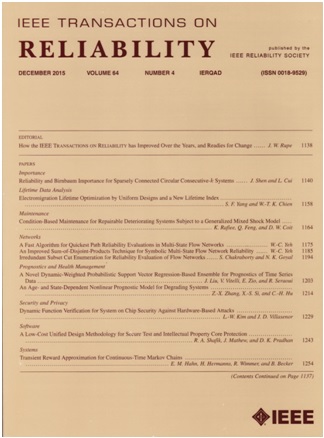MetaMFL:不需要测试oracle的变形多故障定位
IF 5.7
2区 计算机科学
Q1 COMPUTER SCIENCE, HARDWARE & ARCHITECTURE
引用次数: 0
摘要
多故障定位(Multiple fault localization, MFL)用于识别存在于有bug程序中的多个故障(即多个故障)的位置。与单故障定位(SFL)相比,它的难度要大得多。单故障定位(SFL)旨在定位错误程序中的单个故障(即一个故障)。基于聚类的多故障定位(CBMFL)是目前最流行的多故障定位方法之一,在多故障定位中显示出良好的效果。启动cmfl的必要条件取决于获得测试结果的测试oracle(即,通过或失败)。在实践中,测试oracle通常不可用,称为oracle问题,在这些情况下,cmfl变得不可行的。受变形测试在解决oracle问题中的启发,我们尝试将该技术结合到CBMFL中,以扩大其应用范围。因此,我们提出MetaMFL:变形多故障定位,它利用变形测试将cmfl扩展到测试oracle不可用的情况。具体来说,MetaMFL使用变形测试组作为最小的测试单元。它定义了变质特征来表示那些违背了变质关系的特征。利用这些特性,CBMFL可以执行集群来支持并行调试,从而实现无需测试oracle的MFL。大规模实验表明,即使没有可用的测试oracle, MetaMFL也在很大程度上保留了CBMFL的有效性。本文章由计算机程序翻译,如有差异,请以英文原文为准。
MetaMFL: Metamorphic Multiple Fault Localization Without Test Oracles
Multiple fault localization (MFL) identifies the positions of multiple faults (i.e., more than one fault) residing in a buggy program. It is notably more difficult as compared with single fault localization (SFL) which aims to locate a single fault (i.e., one fault) in a buggy program. Clustering-based multiple fault localization (CBMFL) is amongst the most popular MFL approaches, showing promising results in multiple fault localization. The requisite of launching CBMFL depends on test oracles to acquire the test results (i.e., a pass or a failure). In practice, test oracles are commonly not available known as the oracle problem, and CBMFL becomes infeasible in these cases. Inspired by metamorphic testing in solving the oracle problem, we attempt to combine this technique into CBMFL to broaden its application scope. Thus, we propose MetaMFL: Metamorphic Multiple Fault Localization, which leverages metamorphic testing to extend CBMFL to the cases where test oracles are not available. Specifically, MetaMFL uses metamorphic testing groups as minimum units of testing. It defines metamorphic features for representing those that have violated metamorphic relations. Using these features, CBMFL can perform clustering to support parallel debugging, thus achieving MFL without test oracles. The large-scale experiments show that MetaMFL largely retains the effectiveness of CBMFL even though test oracles are not available.
求助全文
通过发布文献求助,成功后即可免费获取论文全文。
去求助
来源期刊

IEEE Transactions on Reliability
工程技术-工程:电子与电气
CiteScore
12.20
自引率
8.50%
发文量
153
审稿时长
7.5 months
期刊介绍:
IEEE Transactions on Reliability is a refereed journal for the reliability and allied disciplines including, but not limited to, maintainability, physics of failure, life testing, prognostics, design and manufacture for reliability, reliability for systems of systems, network availability, mission success, warranty, safety, and various measures of effectiveness. Topics eligible for publication range from hardware to software, from materials to systems, from consumer and industrial devices to manufacturing plants, from individual items to networks, from techniques for making things better to ways of predicting and measuring behavior in the field. As an engineering subject that supports new and existing technologies, we constantly expand into new areas of the assurance sciences.
 求助内容:
求助内容: 应助结果提醒方式:
应助结果提醒方式:


